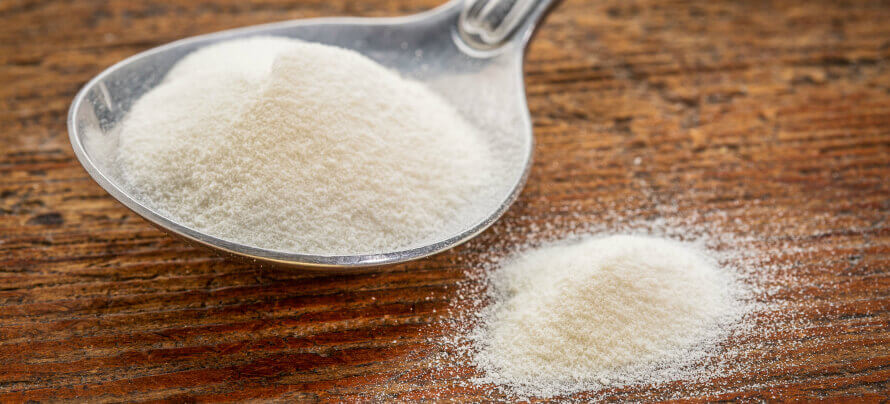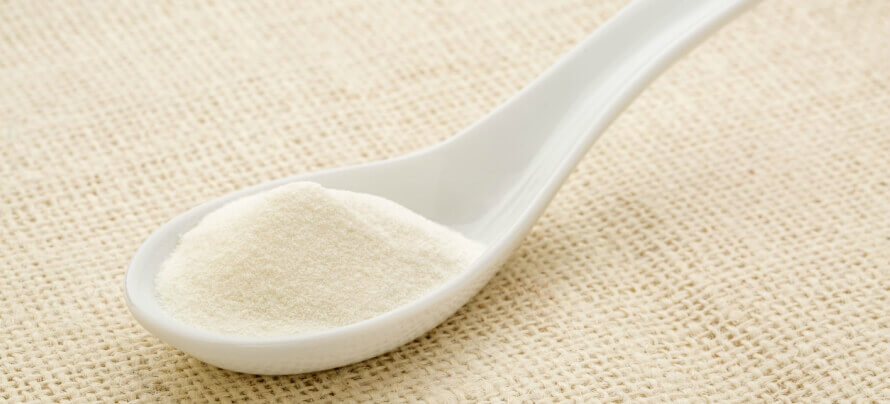Key Takeaways
- People take collagen peptides to improve joint and skin health and improve sleep.
- There’s good evidence that collagen peptides can improve skin health and appearance, and some evidence that they may help with joint health and sleep quality.
- If you want to improve the health and appearance of your skin, protect your joints, and improve your sleep, then collagen peptides are worth taking.
Want to build stronger muscles?
Easy—eat animal muscles.
Want to get all of the right vitamins and minerals for liver health? Eat animal liver to support your own liver.
Want to support ovarian health? Eat eggs to support your own eggs—wait, no, don’t do that.
This mentality, the whole “you are what you eat” mentality, is one that pops up in nutrition and supplementation every now and then.
It’s not overly common, because saying you’ll become a mushroom by eating mushrooms makes no sense, but when it pops up it can be pretty attractive.
Many people make connections to components in the thing you’re eating, assume that simply eating them makes them behave the same, and theory flies off the handle faster than the Flash biking on Red Bull. People drawing lines from A to B and just assuming that it’s true.
It’s the same logic that make people eat testicles thinking that it made them more manly and boosted testosterone after all—when you’re cutting testicles off of an apex predator cause your penis isn’t working as well as it used to you know you’re doing something wrong.
Anywho, why do I mention all of this? It’s because collagen protein, and specifically collagen peptides, have made a resurgence.
Collagen protein is a blanket term referring to all forms of connective tissue in animals, which are usually seen as an industrial byproduct. Tendons, ligaments, skin, and even at times bones are all found under this blanket statement.
You may have heard that collagen peptides can improve anything that collagen, itself, makes up in the body—connective tissues like your joints and your skin in particular.
So is supporting your own collagen as simple as eating some of it? Perhaps this is a tiger ball issue where the only connection between the two is the name?
Collagen is cheap, so is this beneficial to supplement or is it just people trying to cash in on an industrial waste product?
Read on to find out and you might be surprised …
Table of Contents
+
What Is Collagen Protein?
Collagen protein refers to protein sources that come from connective tissues and sometimes bone.
Ligaments, tendons, and bone if we’re going to go there are among the most prominent tissues on an animal’s body. While many times they’re treated as nothing more than waste products they can also be used for supplemental purposes.
Partial hydrolysis of these tissues results in the production of gelatin which can be seen as somewhat synonymous to collagen protein supplements.
Compared to other protein sources, collagen and gelatin proteins tend to be very high in glycine (at times up to a third of all amino acids) while also fairly high in:
- Proline
- Hydroxyproline
- Alanine
- Glutamic acid
The branched chain amino acid content is remarkably low in collagen and gelatin proteins, unless added from an external source, while there is next to no methionine of cystine (the sulfur containing essential amino acids.)
Most claims surrounding collagen and gelatin protein are based on the remarkably high glycine content of the protein or the very low L-methionine content.
Recommended Reading:
What Are Collagen Peptides?

When it comes to collagen there are two types that we should concern ourselves with:
- Type I collagen. Supplementally, this is a large bunch of partially hydrolyzed connective tissue that has a high glycine content.
- Type II collagen. Supplementally, these are isolated collagen peptides (small structures made from amino acids) with unique properties and functions.
It’s similar to how whey protein has peptides like ß-lactoglobulin or alpha-lactalbumin in it which can do things to the body beyond simply providing amino acids—peptides have unique roles and the type II collagen peptides (or UC-II) are quite effective at helping joint pain and inflammation, it’s why we included them in Fortify after all.
However, studies showing benefits to rheumatism use low doses of the isolated peptides.
Producing gelatin, at the very least, requires partial hydrolysis of the connective tissue. The collagen peptides that are proven to work use undenatured collagen peptides so it’s plausible that hydrolyzed or partially hydrolyzed collagen supplements lose out on these unique benefits of the peptides.
If you want the benefits of UC-II it may be best to just supplement UC-II directly.
Collagen peptides, or UC-II, should be seen as a separate supplement when compared to bulk collagen protein supplements.
Recommended Reading:
Why Do People Supplement with Collagen Peptides?
Aesthetics, specifically the health of the skin and hair (with some emphasis on the nails), are brought up a lot when it comes to collagen peptides.
This may be due to how the amino acids in collagen protein are somewhat similar to those found in skin as well, or perhaps due to how Kardashians are marketing collagen protein (…yay?), but it’s by far the most common reason to supplement at the time of this article.
The logic behind collagen peptides helping aesthetics is similar to the logic behind how collagen peptides can help joint health as well— although the claims for joint health could also refer to UC-II (that actually does work.)
You are what you eat so eat more joints and skin!
Of course, if that worked then tiger testicles would be the best testosterone booster known to man like traditional asian medicinal practices said they would be. I’m a bit skeptical of anything that follows this motif personally (although, admittedly, it does work sometimes.)
Beyond those two major claims there are other lesser claims surrounding:
- Sleep, due to the high glycine content of collagen and previous studies showing improvements in sleep with glycine supplementation (I’ll temporarily give this claim a seal of approval since we include glycine in Lunar).
- Gut health, although I was unable to determine what the initial reason it’s recommended for gut health. Seems to be a claim out of left field.
- Longevity, due to some people theorizing about the glycine to L-methionine ratio.
Let’s look at what collagen protein and peptides do and don’t do.
Recommended Reading:
What Are the Benefits of Collagen Protein and Peptides?

This section is going to be a bit less, well, “authoritative” than they usually are.
Collagen supplements have little practical evidence for them, meaning studies where 20+ grams of collagen is plopped into your face hole don’t exist much, but a lot of guesstimates and extrapolations can be made—just with a grain of salt or seven.
Collagen Peptides and Joint Health
One of the major claims surrounding collagen is how it can support the synthesis of joint tissue.
This is a pretty major claim. Most joint health supplements merely slow the seemingly inevitable decay of joint tissue and claim benefits from doing that but, if there is something that reliably boosts collagen protein synthesis, then it could become an ideal “foundation” for stacks.
A lot of these claims came from this study where gelatin (at around 45 grams a day, in 3 doses, spread over 3 days) paired with vitamin C was able to increase blood amino acid levels and also increase the amount of amino acids deposited into connective tissue.
It seemed to increase the rate of collagen synthesis as well, although a third of the dose (5 grams 3 times a day) was unable to.
This has been followed up by a study in athletes with ankle problems, although with a specific collagen peptide supplement rather than gelatin (so more similar to UC-II than it is to gelatin), which ended up significantly improving ankle stability while reducing sprains and other injuries.
While there’s insufficient evidence to prove that collagen peptides improve the rate of joint tissue synthesis, it’s a reasonable conclusion and collagen peptides seems to be able to influence joint tissue and function overall.
Recommended Reading:
Collagen Peptides and Sleep
The claims surrounding collagen peptide supplementation and sleep pertain to the glycine content.
As mentioned earlier in the article, glycine has a few studies pertaining to its ability to “improve perceived restfulness of sleep” compared to placebo. It’s a bit weird of a situation since it doesn’t objectively improve sleep parameters but, hey, even in a double blind study people feel better so some shenanigans are happening.
Since collagen protein (peptides or not) and gelatin supplements tend to be around 25 to 33% glycine by weight anyways, getting the target 3 grams of glycine through a small scoop of powder is quite feasible.
However, there do not appear to be any direct studies on gelatin supplementation and sleep.
It seems quite reasonable to assume that collagen peptide supplements can improve sleep if taken before bedtime, due to research on glycine, but there is no direct data on the topic yet.
Recommended Reading:
Collagen Peptides and Skin Health
Collagen is seen as a sort of “base” skin health supplement, being used to support other supplements in a mixture, due to it providing amino acids—you can even find studies where collagen peptides are added almost as a prerequisite.
It’s not just the glycine but also the sizeable hydroxyproline content that’s important there.
These 2 amino acids, and small peptides containing both of them, appear to be technically beneficial to the skin by inhibiting collagen breakdown. Numerous rat studies confirm beneficial effects against damage and generally restorative effects.
So, what about human studies? Does plopping some basic collagen into your mouth have the same benefits as the aforementioned rat studies?
Surprisingly, yes. With quite a few studies on it.
Peptides (rather than fully hydrolyzed collagen protein) have been shown to improve skin hydration, elasticity, transepidermal water loss (a measure of skin strength and softness), and even the visual appearance of cellulite. It doesn’t seem to be enhanced by the addition of vitamin C that, at times, is said to be required.
It seems that collagen peptides based on glycine and hydroxyproline seem to be active in humans after oral ingestion.
What Is the Clinically Effective Dose of Collagen Peptides?
At this moment in time all the studies using collagen peptide or gelatin supplements tend to use significantly varying doses and/or sources of their chosen supplements—it’s quite difficult to pin down an ‘ideal’ dose of collagen, gelatin, or collagen peptide supplement right now.
The only exception to the above is the usage of UC-II for the treatment of symptoms related to rheumatoid arthritis where studies use between 10 to 20 mg UC-II daily.
Beyond that, I guess just plop 15 grams of the collagen or gelatin protein in a shaker bottle and hope for the best? It seems that most instances where individual amino acids are involved that this gives you more than enough of a dose.
If you manage to get a collection of collagen peptides (rather than fully hydrolyzed amino acids) then the skin health studies only need about 3 grams of the supplement to have effects over the course of multiple weeks.
What Types of Results Can I Expect with Collagen Peptides?

The 3 potential benefits of collagen peptides are, surprisingly, all salient (perceivable.)
If sleep is to be improved you will find that, in the morning, you kind of feel a bit better rested. However, the science on how glycine improves sleep is still quite confusing so I cannot say in good faith that you will be more rested. Might be, who knows?
If joint health is to be improved then you may feel a bit more confident in your injuries. You know how sometimes you have a nagging elbow injury, and every time you grab something you just think, “Oh no, this is gonna be bad,” while at other times you know it won’t go badly? Bit more of the latter.
They will still persist, mind you, but it wouldn’t be unreasonable to assume you would be a bit more confident in their mobility and function. It’s uncertain if healing rate will be improved and I won’t go as far to say that it can help mitigate injuries… yet.
If skin care is improved then you will mostly find your skin looking softer and “fuller” or more hydrated. While sag might be attenuated somewhat it’s doubtful that fine wrinkles or crow’s feets will be improved (based on the evidence we have right now.)
Are Collagen Peptides Safe?
At this moment in time no known side-effects are known with oral ingestion of collagen protein.
There is a research model for rodent arthritis known as “collagen-induced arthritis,” which involves injecting collagen peptides into a rat and having their immune system go into panic mode, but don’t inject collagen into your bloodstream and you should be fine.
The Bottom Line on Collagen Peptides
Collagen peptides may indeed be overhyped right now but, ultimately, it isn’t a bad supplement in any way.
The only major failing of it’s that collagen peptides are commonly seen as a protein supplement and, due to low levels of BCAAs and other vital amino acids, they aren’t really the best nutritive protein supplement like dairy, egg, or even rice/pea proteins are.
But even if it’s not highly nutritive it does affect the body in manners which may please you.
For improving skin health, and maybe having happy little side-effects on joints and sleep, collagen protein is not something I will outright recommend but can understand why you would want to take it anyways.
If you would rather just get the benefits of collagen independently, rather than buying a bulky protein powder, then I would advise either Lunar for glycine’s benefits to sleep or Fortify for UC-IIs benefits to joint health.










